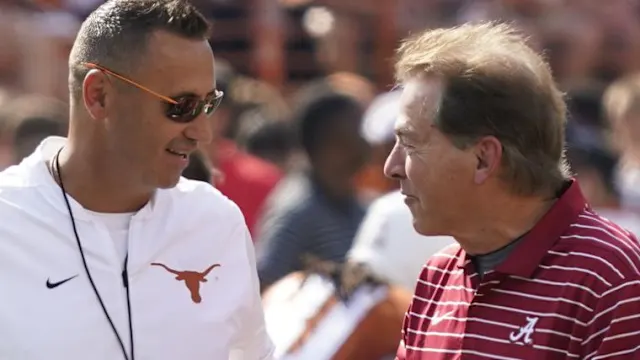Steve Sarkisian has not questioned former Alabama Crimson Tide coach Nick Saban’s career decision
Steve Sarkisian, the head coach of the Texas Longhorns, has shown unwavering respect for former Alabama Crimson Tide coach Nick Saban and has made it clear that he is not questioning Saban’s decision to retire from coaching. Sarkisian, who once served under Saban as the offensive coordinator at Alabama, understands the intensity and the demands of college football at the highest level and appreciates the contributions and legacy that Saban has built over the course of his career. In a world where coaching decisions are often scrutinized and debated, Sarkisian’s stance reflects not just professionalism, but also an acknowledgment of the personal and emotional weight that accompanies such a monumental decision.
Nick Saban’s retirement marked the end of an era in college football. His record at Alabama was nothing short of extraordinary. Over 17 seasons in Tuscaloosa, Saban turned Alabama into the most dominant force in college football. With multiple national championships, SEC titles, and a consistent presence in the national playoff picture, Saban didn’t just win—he set a standard. His impact on the game extended far beyond wins and losses. He shaped players’ lives, mentored coaches, and elevated the status of Alabama to the pinnacle of the sport.
For someone like Steve Sarkisian, who had the opportunity to work closely with Saban, the retirement news carried special significance. Sarkisian joined Alabama initially as an analyst before being promoted to offensive coordinator. His time there helped resurrect his coaching career after personal and professional challenges, and he has often credited Saban with giving him a second chance. That kind of professional relationship fosters a deep level of gratitude and mutual respect. So when Saban made the decision to step away from coaching, Sarkisian didn’t feel it was his place—or anyone else’s—to question that choice. Instead, he chose to honor it.
Sarkisian understands the immense pressure that comes with leading a top-tier college football program. The demands are relentless. From recruiting and media obligations to constant scrutiny and the never-ending pursuit of perfection, it’s a role that consumes one’s life. Saban embraced it all for nearly two decades at Alabama and for even longer across his entire coaching career. There comes a point when even the most successful and driven individuals recognize the need to step back, to shift focus, and to allow someone else to carry the torch. Sarkisian sees that and respects it. His reaction isn’t just that of a fellow coach—it’s that of someone who has lived through the grind and knows how taxing it can be.
The coaching tree that stems from Saban is vast, and Sarkisian is just one of many who have gone on to lead their own programs after working under the legendary coach. That tree is a testament to Saban’s ability not just to win, but to mentor and develop leaders. Sarkisian has spoken highly of the structure, discipline, and culture Saban instills in his teams and his staff. Those lessons have followed Sarkisian to Texas, where he is now leading a program with its own rich history and high expectations. He’s taken what he learned from Saban and applied it in Austin, hoping to build something lasting and successful in his own right.
The respect Sarkisian shows toward Saban is reflective of a larger sentiment within the coaching community. Saban’s peers, former assistants, and rivals have all largely responded to his retirement with admiration and reverence. That’s because, beyond the wins, Saban represented a model of excellence. He demanded the best from everyone around him and rarely, if ever, allowed standards to slip. His approach was methodical, precise, and effective. That kind of legacy is hard to replace, and it’s not something that lends itself to second-guessing. Sarkisian, in acknowledging Saban’s decision without question, reinforces the idea that some decisions stand on their own merit.
Retirement, especially for someone who has been at the top of their profession for so long, is rarely an easy choice. There are always voices—both internal and external—that question whether the time is right, whether there’s more left to achieve, or whether the transition will be smooth. But for someone like Nick Saban, who has achieved virtually everything in the sport, the timing is his to decide. Sarkisian’s unwillingness to question that timing is both a nod to Saban’s accomplishments and an understanding of the deeply personal nature of stepping away from something that has defined a person’s life for decades.
Steve Sarkisian’s current role at Texas also puts him in a unique position. As he builds the Longhorns into a national contender, he faces the same pressures and challenges that Saban faced. There’s an added layer of perspective that comes with that experience. It’s not theoretical for Sarkisian; it’s real. He knows the hours, the stress, the public scrutiny, and the emotional highs and lows. That empathy fuels his respect for Saban’s decision. He doesn’t see retirement as a surrender or a step down; he sees it as a culmination—a well-earned moment of closure for someone who gave everything to the sport.
Moreover, Sarkisian’s own journey has been marked by redemption and growth. His path hasn’t been linear, and the chance he got at Alabama was transformative. That makes his respect for Saban not just professional, but personal. It’s rooted in gratitude and shaped by lived experience. When someone like Saban chooses to retire, Sarkisian sees the bigger picture—the human side of coaching, the toll it takes, and the legacy that endures long after the final game. He knows that questioning such a decision would miss the point entirely.
In the end, Steve Sarkisian’s response to Nick Saban’s retirement is more than just a soundbite—it’s a reflection of the values that bind the coaching fraternity. It’s about loyalty, respect, and recognition of the sacrifices made by those at the highest levels of the game. Saban’s retirement may have shocked some, but for those who truly understand what it takes to do what he did for as long as he did, it makes perfect sense. Sarkisian’s reaction is measured and meaningful. He’s not interested in speculation or judgment; he’s focused on gratitude and respect.
That kind of perspective is rare in today’s sports landscape, where hot takes and instant analysis often overshadow deeper understanding. Sarkisian isn’t playing to the cameras or trying to make headlines. He’s offering a genuine response, grounded in experience and shaped by his own time under Saban’s leadership. In doing so, he reminds us that sometimes the most powerful statements are the ones that show quiet appreciation and deference.
As Sarkisian continues to build his legacy at Texas, he carries with him the lessons learned from one of the greatest coaches of all time. He doesn’t need to question Saban’s decision to retire because he’s seen firsthand what it takes to reach those heights. He knows that stepping away is not a sign of weakness but of wisdom. And in that recognition, he honors the game, the profession, and the man who helped shape his journey.



